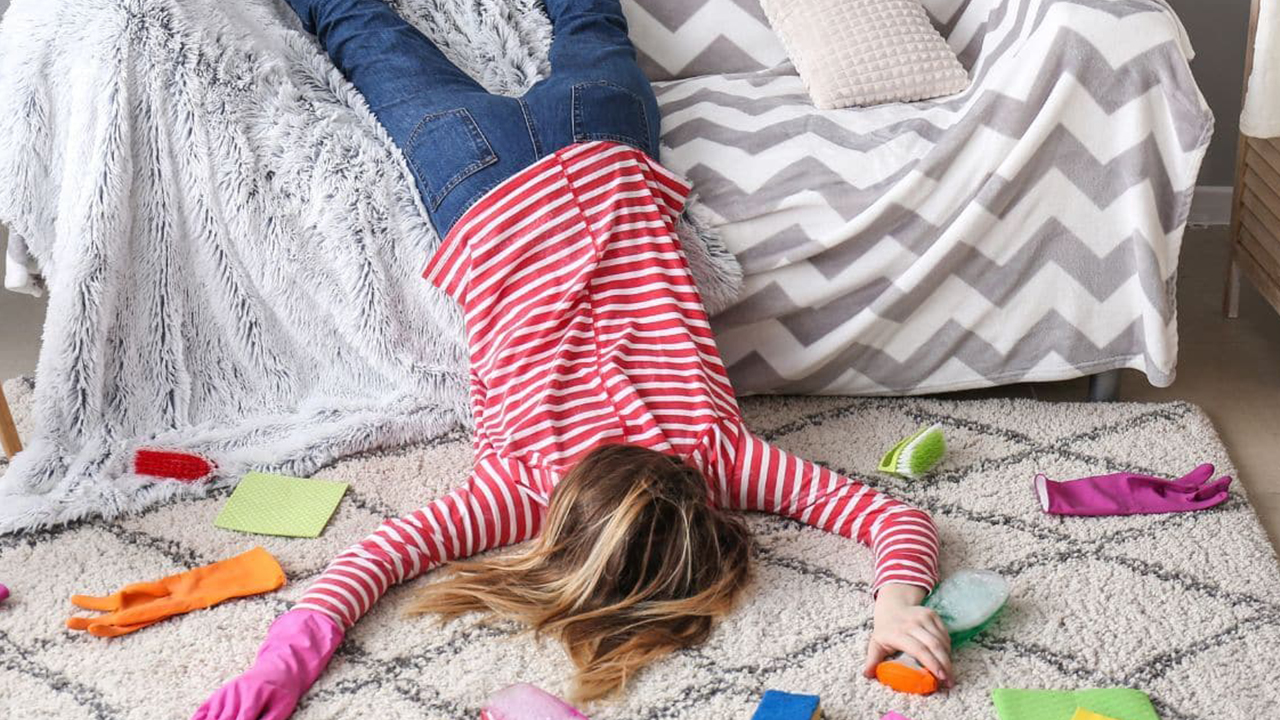Depression can make even the simplest tasks feel overwhelming, including cleaning. A cluttered and unorganized environment can further contribute to feelings of stress and anxiety, making it difficult to feel motivated to clean.
However, a clean and organized space can have a positive impact on mental health. Here, we will discuss the connection between depression and daily tasks, the benefits of a clean environment for mental health, and five tips for how to get motivated to clean when depressed. We’ll also cover how therapy can help with motivation and self-care practices to incorporate throughout the cleaning process.

The Connection Between A Clean Environment And Mental Health
Maintaining a clean environment can have a significant impact on your mental health, especially when you are feeling depressed. Research has shown that clutter and mess can contribute to feelings of being overwhelmed and anxious, making it even more challenging to find the motivation to clean.
On the other hand, having a clean and organized space can promote feelings of calmness and reduce stress levels. It can also provide a sense of accomplishment and control over your surroundings, which can be particularly beneficial when you’re struggling with depression.
5 Tips For How To Get Motivated To Clean When Depressed

Depression can have a profound impact on daily tasks and routines. One of the main symptoms of depression is a lack of motivation and energy, which can make even simple tasks feel overwhelming.
When you’re feeling depressed, even the simplest tasks like cleaning can feel overwhelming. However, maintaining a clean and organized living space can have a positive impact on your mental health. Here are five tips for how to get motivated to clean when depressed:
1.Take Breaks When Needed
Recognizing the importance of taking breaks can prevent burnout and keep you motivated, especially when dealing with depression. During cleaning sessions, it’s crucial to allow yourself time to rest and recharge. Breaking cleaning tasks into smaller chunks makes them more manageable and less overwhelming. Don’t forget to take breaks to engage in activities that bring you joy or relaxation.
Listening to your body and prioritizing self-care while cleaning are vital aspects of maintaining motivation. By incorporating these small breaks into your cleaning routine, you can make the process more enjoyable and sustainable. Remember, it’s okay to take breaks and prioritize your mental health along the way.
2.Make Cleaning A Positive Experience

To make cleaning a positive experience, you can create a pleasant atmosphere by playing music or an engaging podcast in the background. This can help uplift your mood and make the cleaning process more enjoyable. Additionally, find ways to make cleaning fun, such as singing along to your favourite songs while tidying up.
It’s important to practice self-compassion and avoid negative self-talk during the cleaning process. Instead, focus on the benefits of having a clean and organized space for your mental well-being. Experiment with different cleaning methods until you find ones that work for you and bring a sense of satisfaction. By incorporating these strategies, cleaning can become a positive and even rewarding activity.
3.Set Realistic Goals
When struggling with depression, cleaning can feel like an overwhelming task. To make it more manageable, it’s important to set realistic goals. Start by breaking down cleaning tasks into smaller, achievable goals. This could involve tackling one room at a time or focusing on specific areas within each room.
Set a realistic timeline for completing each task, taking into account your energy levels and other commitments. Prioritize which areas or tasks are most important to clean first so you can make progress without feeling overwhelmed.
Remember to adjust your expectations and be flexible with your cleaning goals, as some days may be harder than others. Finally, celebrate each accomplishment, no matter how small it may seem. By setting realistic goals, you can make the process of cleaning more achievable and less daunting.
4.Break Up Cleaning Into Smaller Tasks
Getting motivated to clean and breaking up the cleaning tasks into smaller, more manageable chunks can make a big difference. This strategy helps prevent feeling overwhelmed and allows you to focus on one area or task at a time.
Start by dividing your cleaning tasks into smaller portions that you can tackle easily. By focusing on one specific area or task, you can maintain your focus and motivation throughout the cleaning process. It’s also helpful to tackle the most challenging tasks first. This way, you can build momentum and a sense of accomplishment as you complete each task.
To further break up your cleaning sessions, consider using a timer. Set shorter intervals for cleaning and take breaks in between tasks. This helps you stay energized and motivated while also allowing you to recharge and regroup.
By breaking up cleaning into smaller tasks, you can make the process feel less overwhelming and more attainable. So, grab your cleaning supplies and start tackling those small things one step at a time. You’ll be amazed at what you can accomplish and how it can positively impact your motivation to clean even when you’re feeling depressed.
5.Reward Yourself For Accomplishments
To stay motivated when cleaning while dealing with depression, it’s essential to create a reward system that celebrates your accomplishments. After completing a challenging cleaning task, treat yourself to something enjoyable. It could be a relaxing break or engaging in a leisure activity you love.
By acknowledging and celebrating your progress along the way, you’ll boost your motivation and sense of achievement. Align your rewards with your interests and preferences to make them even more enticing.
Whether it’s watching your favourite TV show, spending time on a hobby, or simply sitting down and enjoying a cup of tea, find rewards that make you feel good. By rewarding yourself for your cleaning efforts, you’ll create positive associations and inspire yourself to tackle even the hardest part of cleaning your home.
The Benefits Of A Clean And Organized Space For Mental Health

Maintaining a clean and organized space can have significant benefits for mental health, especially when feeling depressed. While cleaning may feel like an overwhelming task when experiencing depression, starting with small steps can make a big difference.
Begin by decluttering one area at a time or setting aside short periods each day for cleaning tasks. Remember to be kind to yourself throughout the process and celebrate each small victory along the way. Here are a few key reasons why a clean space can contribute to improved mental well-being:
- Reduced Stress: Clutter and mess can create visual and mental chaos, leading to increased stress levels. Keeping your space clean and organized can help create a sense of calm and reduce feelings of overwhelm.
- Increased Productivity: A clean environment can also improve focus and productivity. When your space is clutter-free, it becomes easier to locate items and stay on top of tasks, leading to a greater sense of accomplishment.
- Improved Mood: Living in a clean and tidy space can positively impact your mood. Coming home to an organized environment can provide a sense of peace and happiness, helping to alleviate symptoms of depression.
How Does Therapy Contribute To Motivation?

Therapy can play a crucial role in helping individuals with depression find motivation to clean. Therapists can provide support, guidance, and tools to help individuals overcome the obstacles that depression can pose. Through therapy, individuals can explore underlying issues that may be contributing to their lack of motivation and develop coping strategies to overcome them.
Therapists can also help individuals set realistic goals and break tasks into manageable steps, making cleaning feel less overwhelming. Additionally, therapists can provide encouragement and accountability, helping individuals stay motivated and on track with their cleaning routines.
Seek Support From Friends Or Family Members
When you’re feeling depressed, finding the motivation to clean can be incredibly challenging. However, seeking support from friends or family members can make a big difference. Letting your loved ones know that you’re struggling and asking for their help can provide the motivation and encouragement you need to get started.
They can offer assistance by either cleaning alongside you or simply providing emotional support and encouragement throughout the process. Remember, it’s okay to ask for help when you need it, and reaching out to your support system can make cleaning feel less overwhelming and more manageable.
Practice Self-Care And Self-Compassion Throughout The Cleaning Process

When you’re feeling depressed, cleaning can feel like an overwhelming task. However, practising self-care and self-compassion throughout the cleaning process can help you get motivated and make it more manageable. Cleaning is not a reflection of your worth as a person, and it’s okay if things don’t look perfect all the time.
Practice self-care and self-compassion throughout the process, and remember that every little step counts towards creating a clean and comfortable space for yourself. Here are some tips to help you:
- Break It Down Into Smaller Tasks: Instead of tackling the whole house at once, break it down into smaller tasks that you can accomplish one at a time. This way, you won’t feel overwhelmed by the enormity of the task.
- Set Realistic Goals: Don’t expect yourself to clean everything perfectly in one go. Set realistic goals for what you want to accomplish each day, and be proud of yourself for completing them.
- Take Breaks When Needed: It’s important to listen to your body and take breaks when needed. Pushing yourself too hard can lead to burnout and make it even harder to stay motivated.
- Reward Yourself: After completing each task or milestone, reward yourself with something you enjoy. This could be taking a break and watching an episode of your favourite TV show or treating yourself to a small treat.
Conclusion
When you are feeling overwhelmed and depressed, cleaning may seem like an impossible task. However, by taking small steps and implementing these tips, you can gradually find motivation to clean and improve your living environment.
Remember to be kind to yourself and take breaks when needed. Make the cleaning process a positive experience by playing music or rewarding yourself for completing tasks. Set realistic goals and break up cleaning into smaller, more manageable tasks.
Additionally, seeking support from friends, family, or a therapist can provide encouragement and accountability. Finally, remember that a clean and organized space can have a positive impact on your mental health. So, it is essential to know how to get motivated to clean when depressed.
Frequently Asked Questions
1.What If Some Days Are Just Too Hard?
Ans: On days when cleaning feels overwhelming, it’s important to be kind to yourself. Taking breaks is okay, and practising self-care is crucial during these difficult times. Break tasks into smaller steps to avoid feeling overwhelmed, and consider seeking professional help if depression is making it difficult to clean regularly.
2.Why Do I Have Zero Motivation To Clean?
Ans: Feeling unmotivated to clean can be due to various factors, such as depression, anxiety, or simply feeling overwhelmed. Understanding the root cause can help in finding solutions. Setting small achievable goals, breaking tasks into smaller steps, and rewarding yourself along the way can help boost motivation.
3.How Do I Start Cleaning When I Have No Motivation?
Ans: When facing a lack of motivation to clean, breaking the task into smaller, more manageable pieces can help. Set achievable goals and reward yourself for completing them. Put on music or an audiobook to make the task more enjoyable. Consider enlisting the help of a friend or family member to tackle the task together.
4.Can Cleaning Actually Help Alleviate Symptoms Of Depression?
Ans: Cleaning has been found to have a positive impact on mental health. Studies show that a clean environment can improve mood and provide a sense of control. However, it’s important to remember that cleaning alone is not a substitute for professional treatment or therapy. Seek help if experiencing symptoms of depression.
5.Are There Any Particular Cleaning Activities That Are Better Suited For Someone With Depression?
Ans: Cleaning activities that are better suited for someone with depression include focusing on small areas like countertops or sinks instead of tackling entire rooms and breaking up tasks into manageable chunks. Incorporating mindfulness techniques, such as focusing on breathing while cleaning, can also help calm the mind and increase motivation. Doing a little bit of cleaning each day is more effective than trying to do it all at once.




